Overview
This article identifies ten distribution software solutions designed to streamline operations for businesses. Among these solutions are 10X ERP, Microsoft Azure, and AWS, each noted for specific features and benefits. These include:
- Real-time data processing
- Scalability
- Advanced analytics
These features collectively enhance operational efficiency and support informed decision-making for distributors. By leveraging such technologies, businesses can significantly improve their operational workflows, driving better results and competitive advantage.
Introduction
In an increasingly digital world, the efficiency of distribution operations can make or break a business. The right distribution software not only streamlines processes but also enhances decision-making through real-time data access and analytics. As companies grapple with the complexities of logistics and inventory management, a critical question arises: which distribution software solutions can provide the competitive edge needed to thrive in 2025? This article explores ten innovative software platforms designed to optimize distribution operations, each offering unique features and benefits that promise to transform the way businesses operate.
10X ERP: Cloud-Based ERP for Real-Time Data Processing
10X ERP presents a powerful cloud-based distribution software platform that facilitates real-time information processing, empowering distributors with instant access to critical details regarding inventory, sales, and financials from any location. This capability is vital for making swift, informed decisions, minimizing operational delays, and significantly enhancing overall efficiency. The platform’s intuitive interface, paired with a streamlined onboarding process, ensures that teams can quickly adapt to the system, maximizing productivity from the outset. By automating processes and reducing manual errors, 10X ERP not only improves operational workflows but also nurtures a culture of responsiveness and agility within companies using distribution software.
It is recommended that 17% of the project’s budget be allocated for training to ensure effective onboarding, as companies that invest less than 13% on training are three times more likely to face issues. This underscores the importance of proper training in harnessing the full potential of 10X ERP. As noted by Genius ERP, ‘Accurate quoting is essential to a custom manufacturing business,’ highlighting the crucial role of precise information in decision-making. Additionally, the costs associated with inadequate requirements analysis can lead to significant financial repercussions, emphasizing the necessity for thorough planning and execution in ERP implementations.
Successful case studies demonstrate how distributors have transformed their operations through the efficient use of distribution software, showcasing the tangible benefits of real-time information processing.
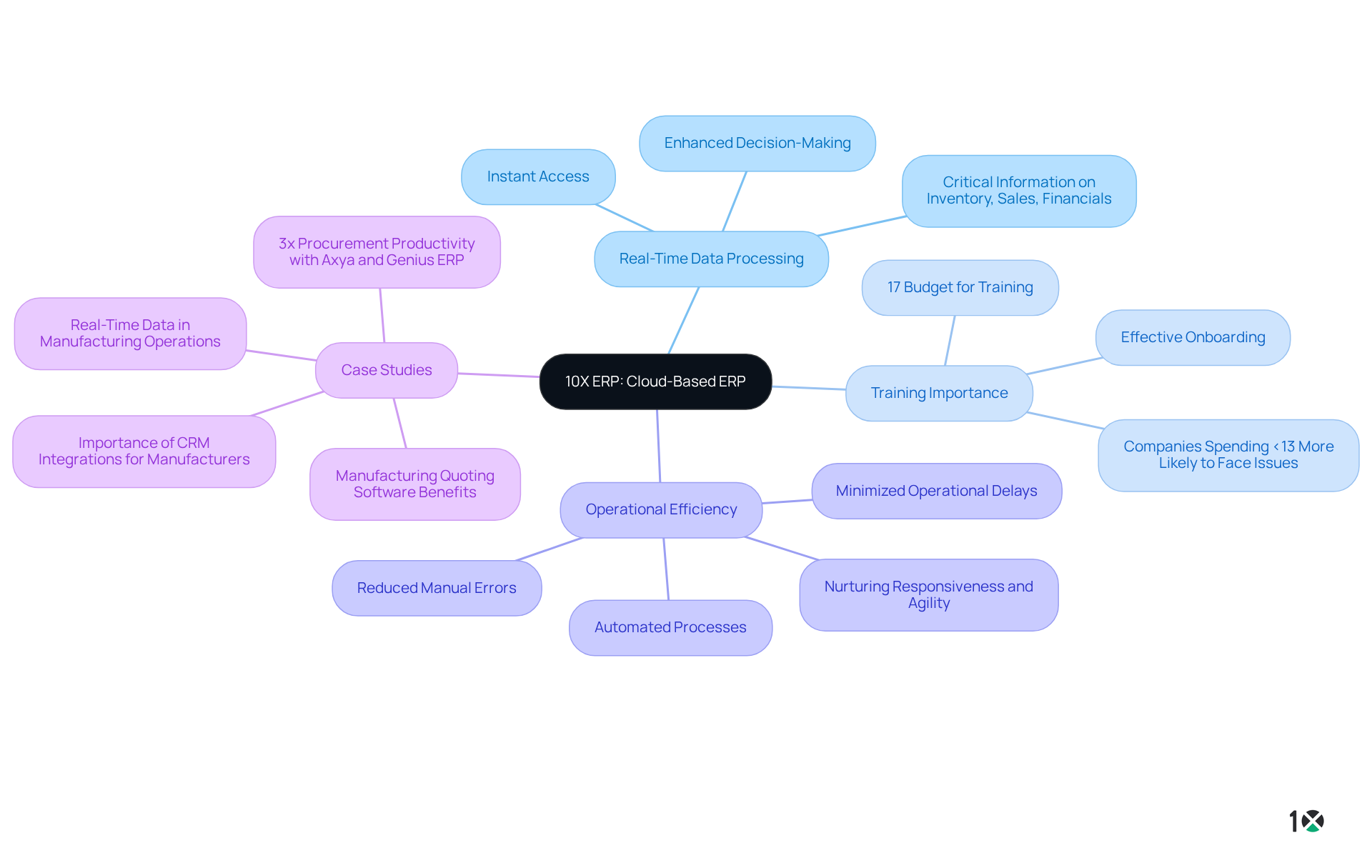
Microsoft Azure: Scalable Cloud Services for Distribution
Microsoft Azure offers a comprehensive suite of scalable cloud services tailored specifically for companies using distribution software. Its robust infrastructure adeptly manages large volumes of data, ensuring seamless integration with existing systems through an API-first approach. This capability is essential for businesses looking to enhance operational efficiency. Azure’s advanced analytics tools provide critical insights into supply chain performance, with AI services contributing to 9% of Azure’s revenue in Q4 2024. This empowers distributors to optimize their processes with distribution software and make informed, data-driven decisions. As organizations increasingly transition to online solutions, Azure emerges as a preferred choice, with nearly 70% of organizations worldwide having utilized its services since 2015. Furthermore, Azure’s online infrastructure services market share in Q4 2024 is projected to reach 33%, underscoring the growing reliance on internet technology to optimize operations and boost overall productivity in the logistics sector.
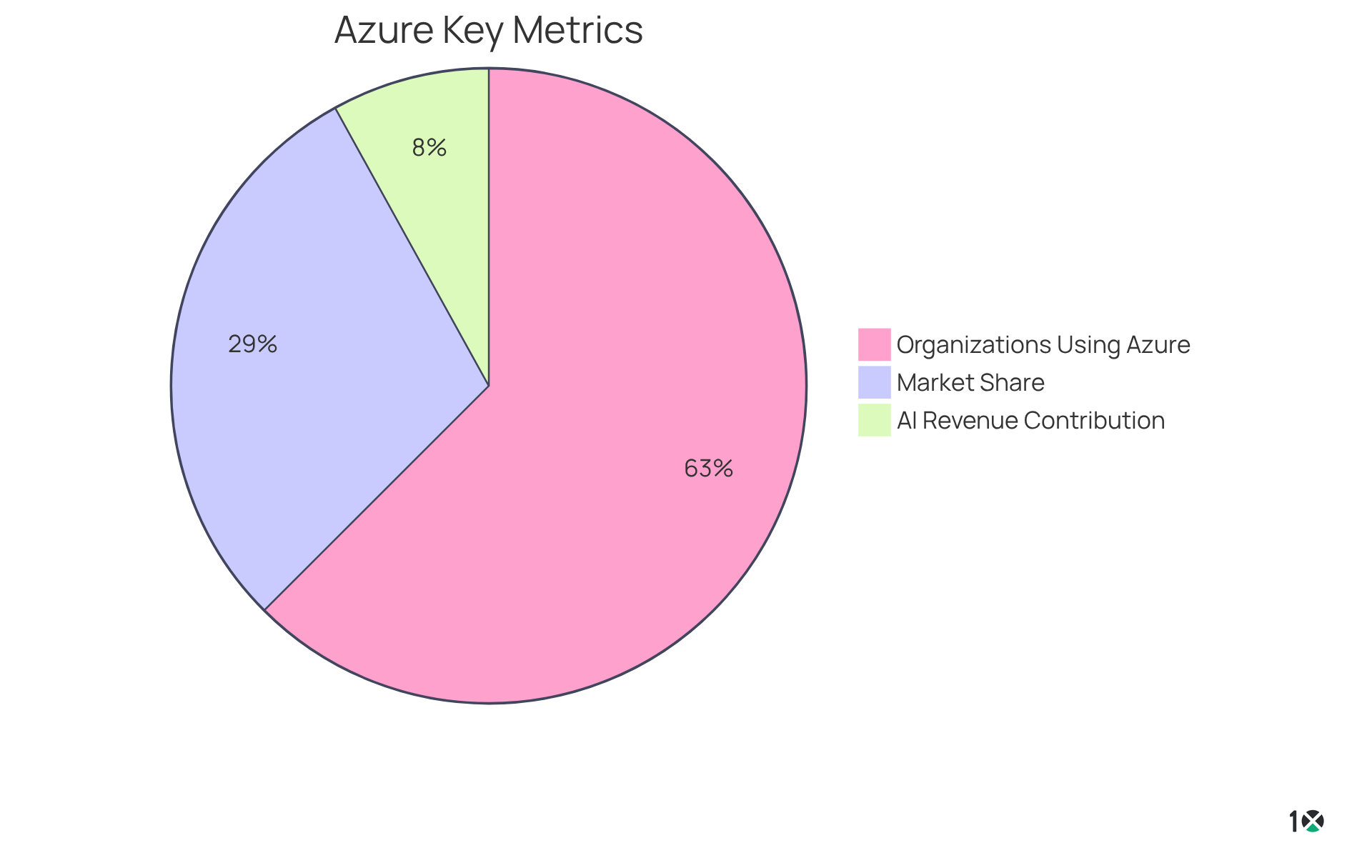
Amazon Web Services (AWS): Comprehensive Cloud Tools for Distribution
Amazon Web Services (AWS) offers a comprehensive suite of cloud tools tailored to the distinct requirements of distribution companies using distribution software. With advanced data storage solutions and sophisticated machine learning capabilities, AWS empowers businesses to streamline their logistics and inventory management processes effectively. Its robust infrastructure guarantees high availability and scalability, enabling suppliers to adapt to shifting market demands without compromising performance.
As we look to 2025, the advantages of cloud tools for logistics management are increasingly evident. Companies utilizing AWS can attain enhanced operational efficiency, improved delivery accuracy, and superior product availability. For example, AWS’s AI-powered demand forecasting models have shown a 10% improvement in long-term national forecasts for deal events, allowing distributors to align their inventory with customer preferences more effectively.
Recent advancements in AWS logistics and inventory management solutions further emphasize the platform’s commitment to innovation. The launch of tools like the AWS Supply Chain app, which delivers real-time insights and demand forecasts, assists businesses in mitigating risks and enhancing customer experiences. Diego Pantoja-Navajas, Vice President of AWS Supply Chain, noted, “Customers inform us that the undifferentiated heavy lifting required in linking information between various supply chain solutions has hampered their capacity to swiftly observe and react to possible supply chain disruptions.”
Specific advancements, such as updates to the open-source SDK Strands Agents and the introduction of the AWS Supply Chain app, underscore AWS’s dedication to facilitating seamless integration and operational excellence within the supply chain. To fully leverage these tools, distribution companies should consider implementing AWS solutions for their distribution software to enhance inventory management strategies and drive operational success.
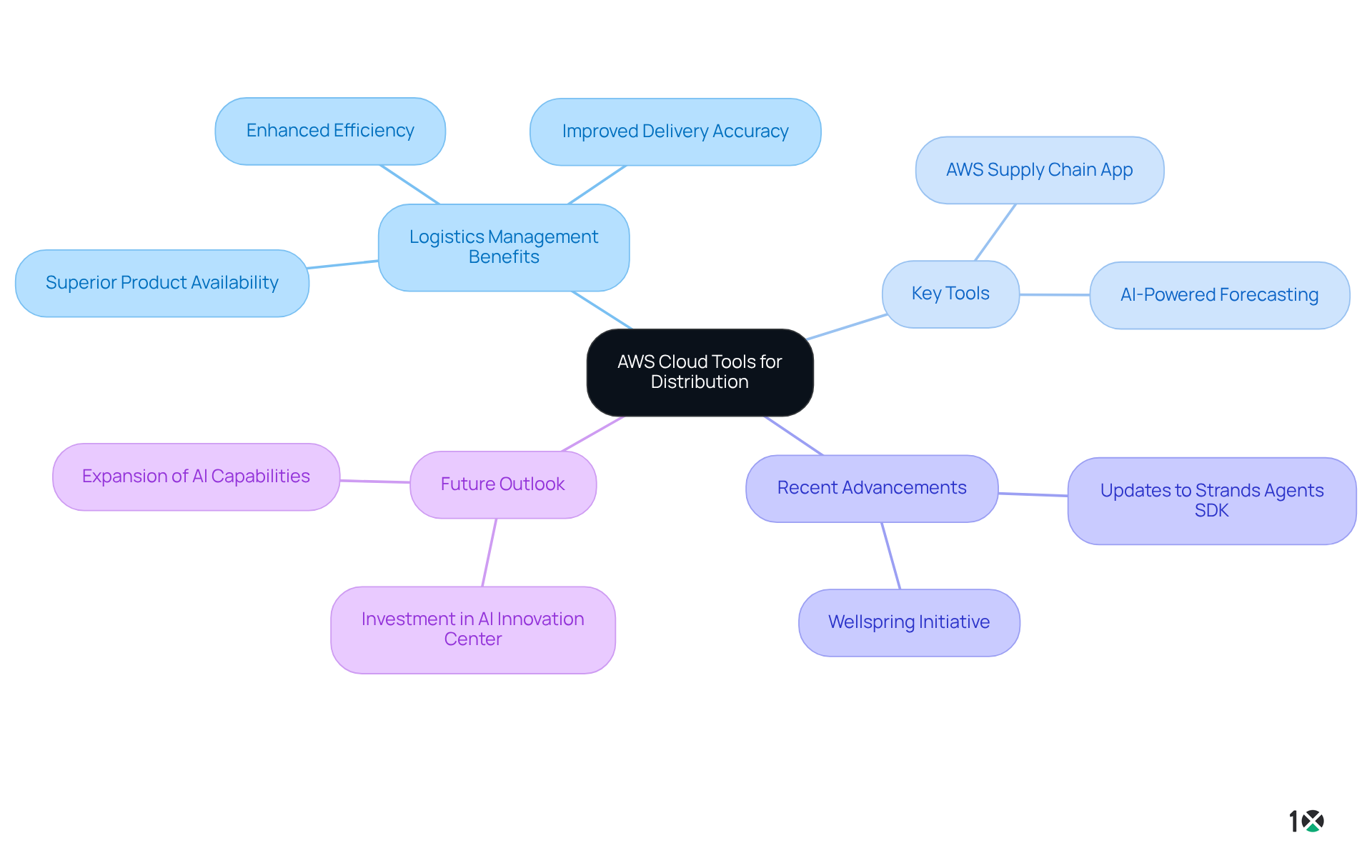
Google Cloud Platform (GCP): Data Analytics for Distribution Optimization
Google Cloud Platform (GCP) stands out with its advanced analytics tools, designed to empower suppliers in optimizing their operations. Services like BigQuery enable businesses to swiftly analyze extensive datasets, revealing critical insights into customer behavior, inventory levels, and supply chain efficiency. This data-driven approach not only facilitates informed decision-making but also helps in reducing costs and improving service delivery. By leveraging these sophisticated tools, suppliers can enhance their operational effectiveness and gain a competitive edge in the market.
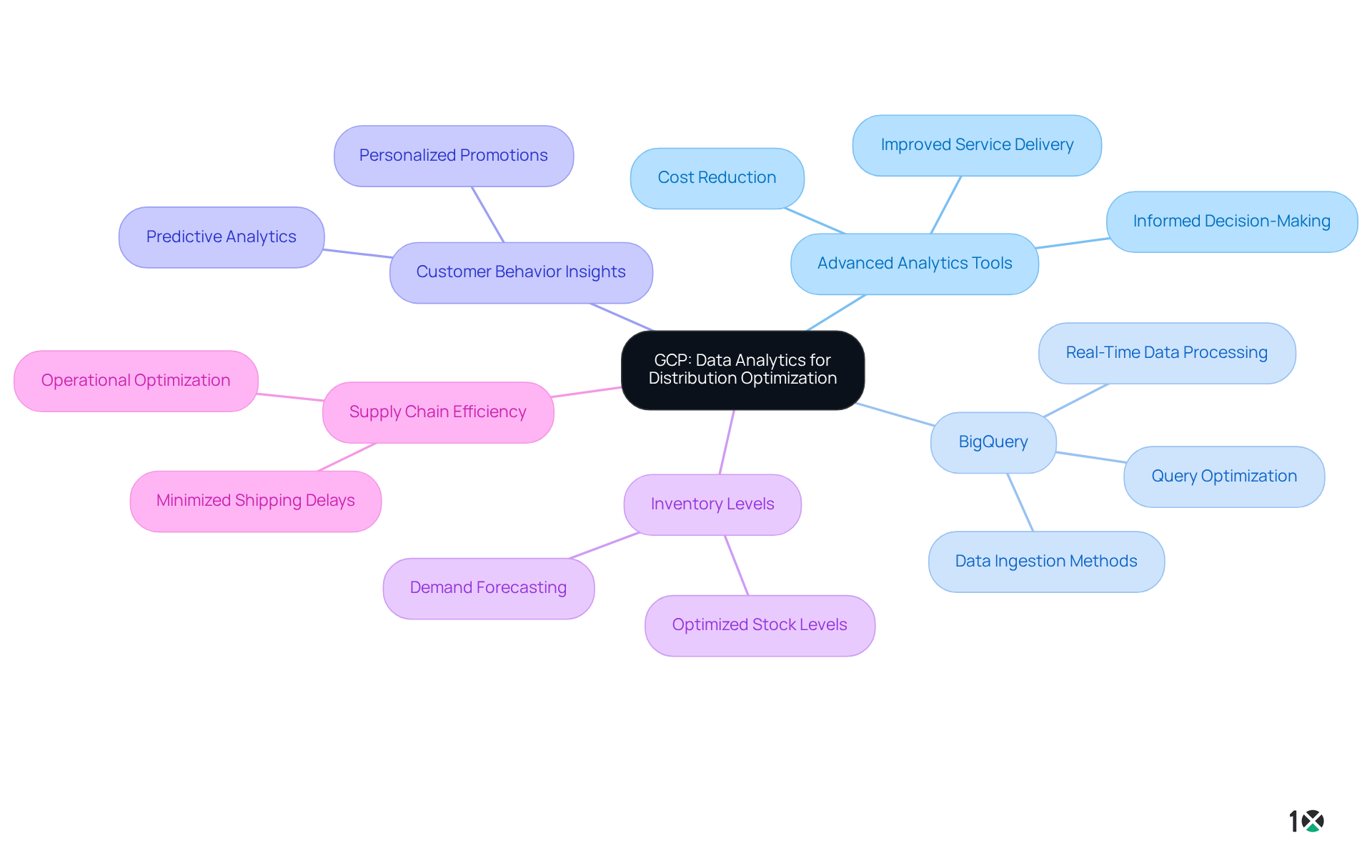
IBM Cloud: Enterprise-Grade Solutions for Secure Distribution
IBM Cloud emerges as a premier choice for companies prioritizing security and compliance in the management of sensitive data. Its robust security features, including advanced encryption and comprehensive identity management, empower distributors to protect their information while maintaining operational efficiency.
Recent industry reports indicate that 85% of enterprises are adopting multi-model strategies, underscoring the rising trend of hybrid infrastructure among distribution companies utilizing distribution software. The platform’s hybrid computing capabilities enable businesses to customize their infrastructure to meet specific operational requirements.
For instance, a case study involving a leading distributor demonstrated how IBM Cloud’s distribution software enhanced their information protection strategies while ensuring adaptability and scalability in their operations. As the adoption of hybrid computing accelerates, companies leveraging IBM’s platform can refine their information protection strategies while retaining flexibility and scalability.
To maintain a competitive edge, operations managers should consider integrating IBM Cloud solutions to uphold compliance and security in their data management practices.
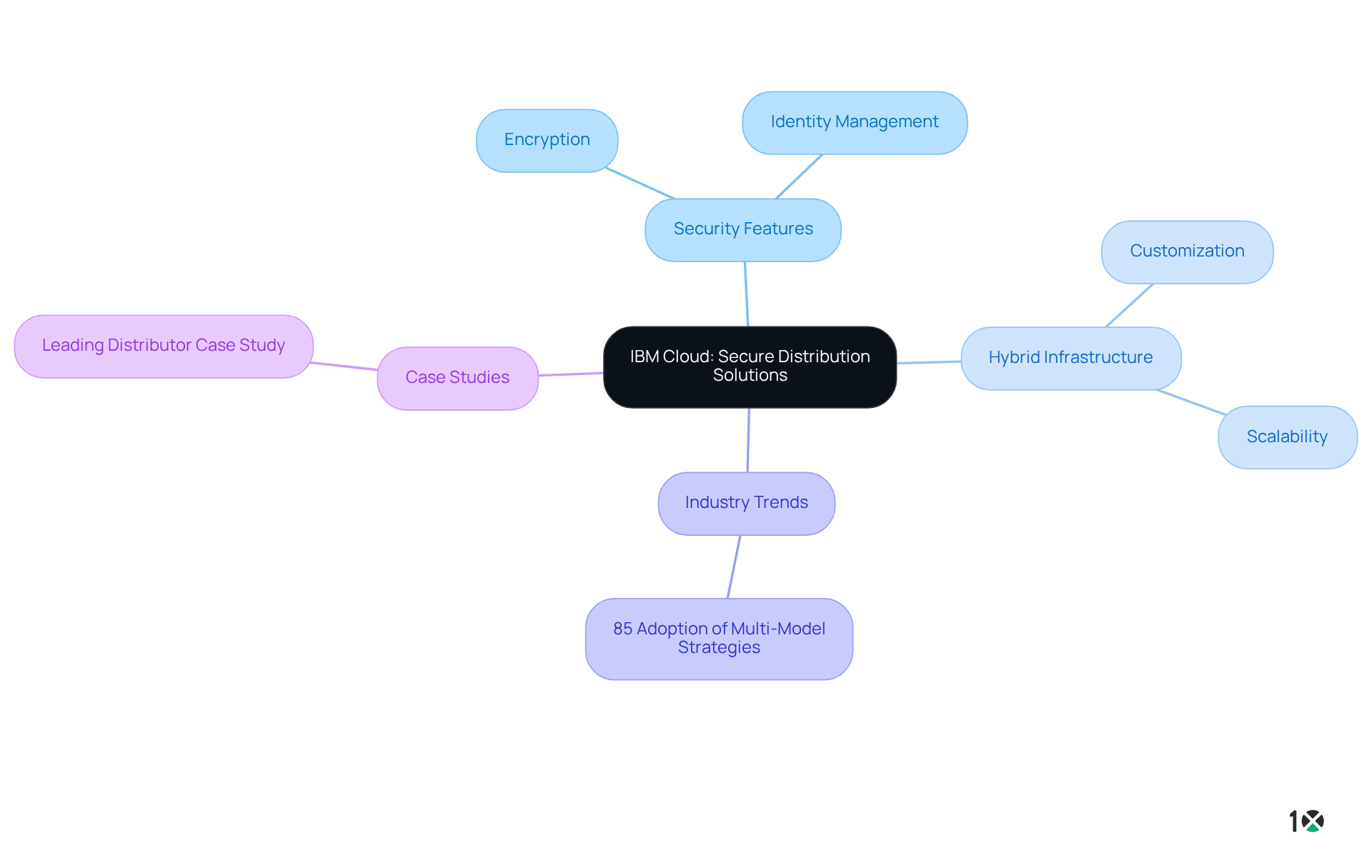
DigitalOcean: Cost-Effective Cloud Solutions for Small Distributors
DigitalOcean provides affordable online solutions tailored for small suppliers, including distribution software that features transparent pricing and user-friendly interfaces to facilitate swift application deployment without incurring high costs. Its scalable infrastructure, along with distribution software, empowers small distributors to expand operations as needed, enabling effective responses to market fluctuations without financial strain.
With the increasing reliance on online storage—evidenced by 98% of companies utilizing these services—DigitalOcean sets itself apart by offering a platform that not only supports growth but also enhances operational efficiency. This is particularly vital, as 71% of enterprises encounter difficulties when migrating data to the cloud, making user-friendly solutions like DigitalOcean indispensable for small businesses aiming to excel in a competitive environment.
Moreover, considering that the average cost of hosting back-office infrastructure reaches $15,000 per month, DigitalOcean’s budget-friendly solutions present a significant financial advantage for small suppliers.
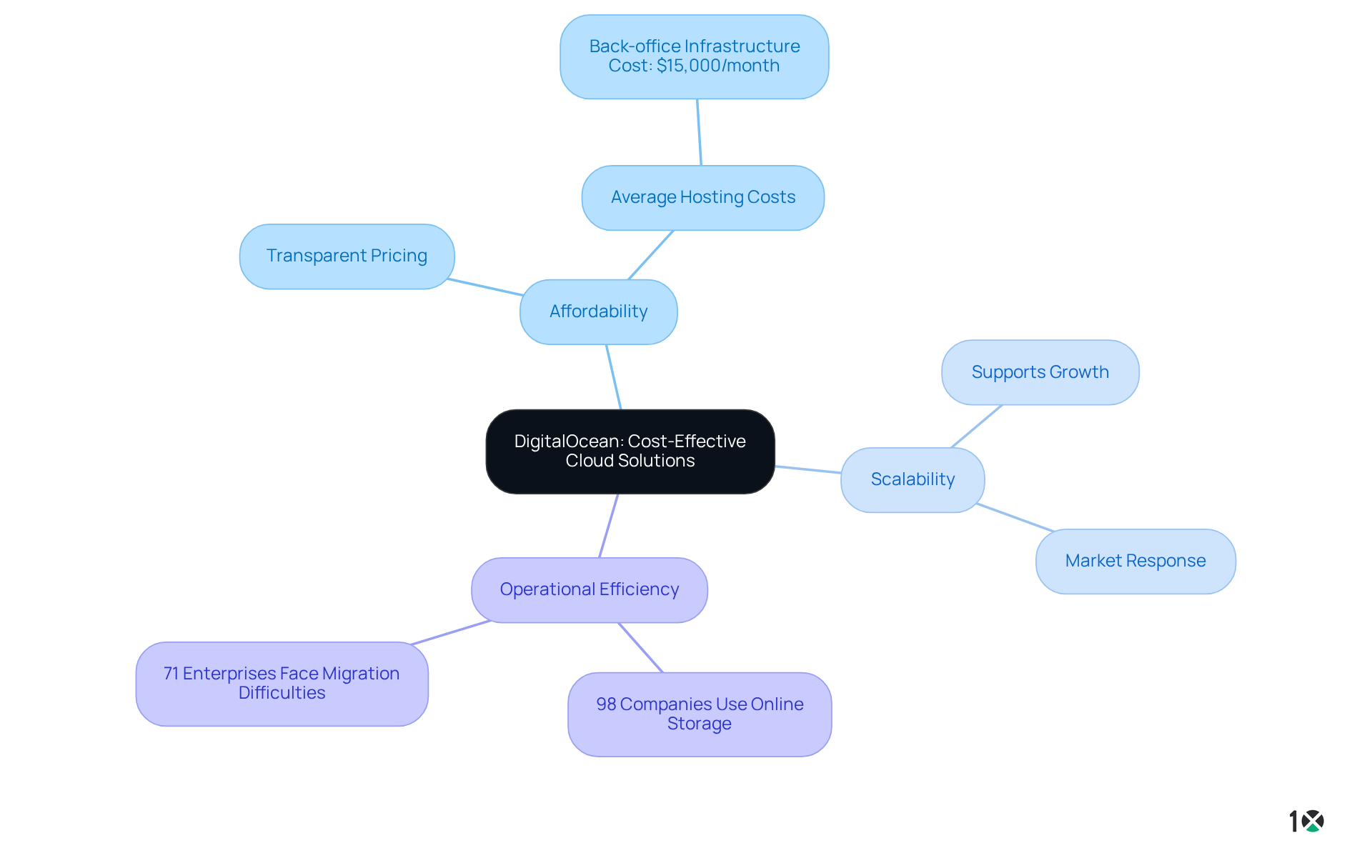
Docker Hub: Containerization for Efficient Software Deployment
Docker Hub stands as a pivotal platform for containerization, empowering distributors to deploy software with remarkable efficiency across diverse environments. By leveraging containers, businesses can achieve consistent application performance, significantly reduce deployment times, and streamline scaling processes. Notably, companies that have transitioned to microservices report a staggering 75% reduction in deployment times, underscoring the transformative impact of this technology. Furthermore, the integration of Docker Hub with CI/CD pipelines optimizes development workflows, enabling teams to deliver updates and new features at an accelerated pace.
Additionally, the ability to isolate dependencies within containers ensures that applications run seamlessly, regardless of the environment. This effectively eliminates the common ‘it works on my machine’ problem, enhancing operational agility. Consequently, Docker Hub not only improves delivery operations but also promotes a more responsive approach. As one industry expert aptly noted, “By packaging apps and their dependencies into containers, developers can ensure that the software will run the same no matter where it’s deployed.
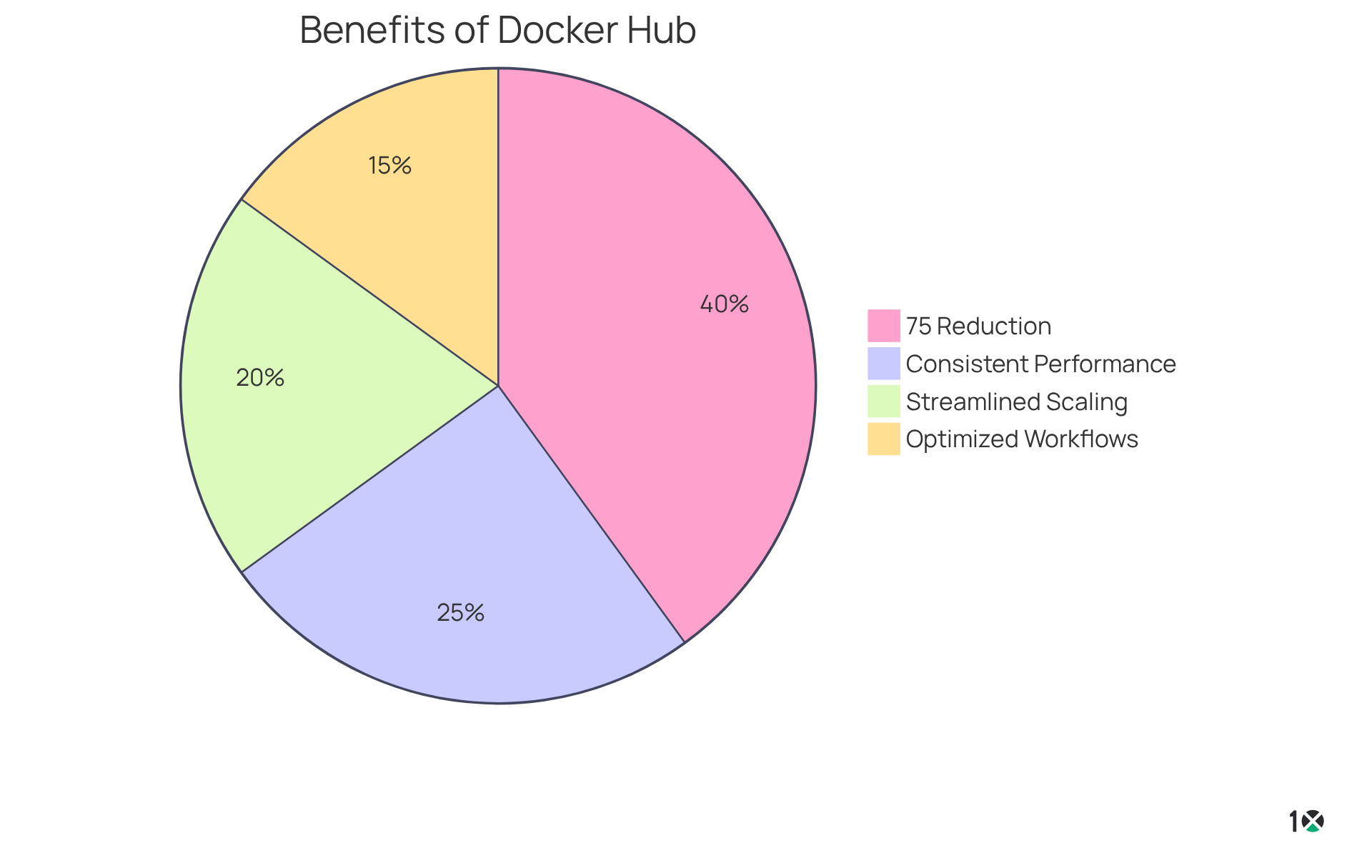
GitHub: Collaboration and Version Control for Distribution Software
GitHub stands as a pivotal platform for collaboration and version control in software development, especially for logistics companies. Its robust features, such as pull requests and issue tracking, significantly enhance teamwork and streamline the development process. By leveraging GitHub, teams can maintain high code quality, manage changes efficiently, and ensure alignment on project objectives.
Best practices for version control are essential for optimizing collaboration. Maintaining clear commit messages and implementing a structured branching strategy are critical. For instance, teams that utilize feature branches report a 63% preference for managing new functionalities, leading to marked improvements in workflow efficiency. Furthermore, organizations that actively engage in code reviews through GitHub see a 37% reduction in post-deployment bugs. This practice boosts overall software reliability by ensuring that code changes undergo thorough vetting before deployment.
Linking related issues or tasks in pull requests provides better context, further enhancing collaboration. As operations managers in logistics firms increasingly adopt GitHub for version control, they reap the benefits of improved collaboration, streamlined processes, and a more responsive development environment.
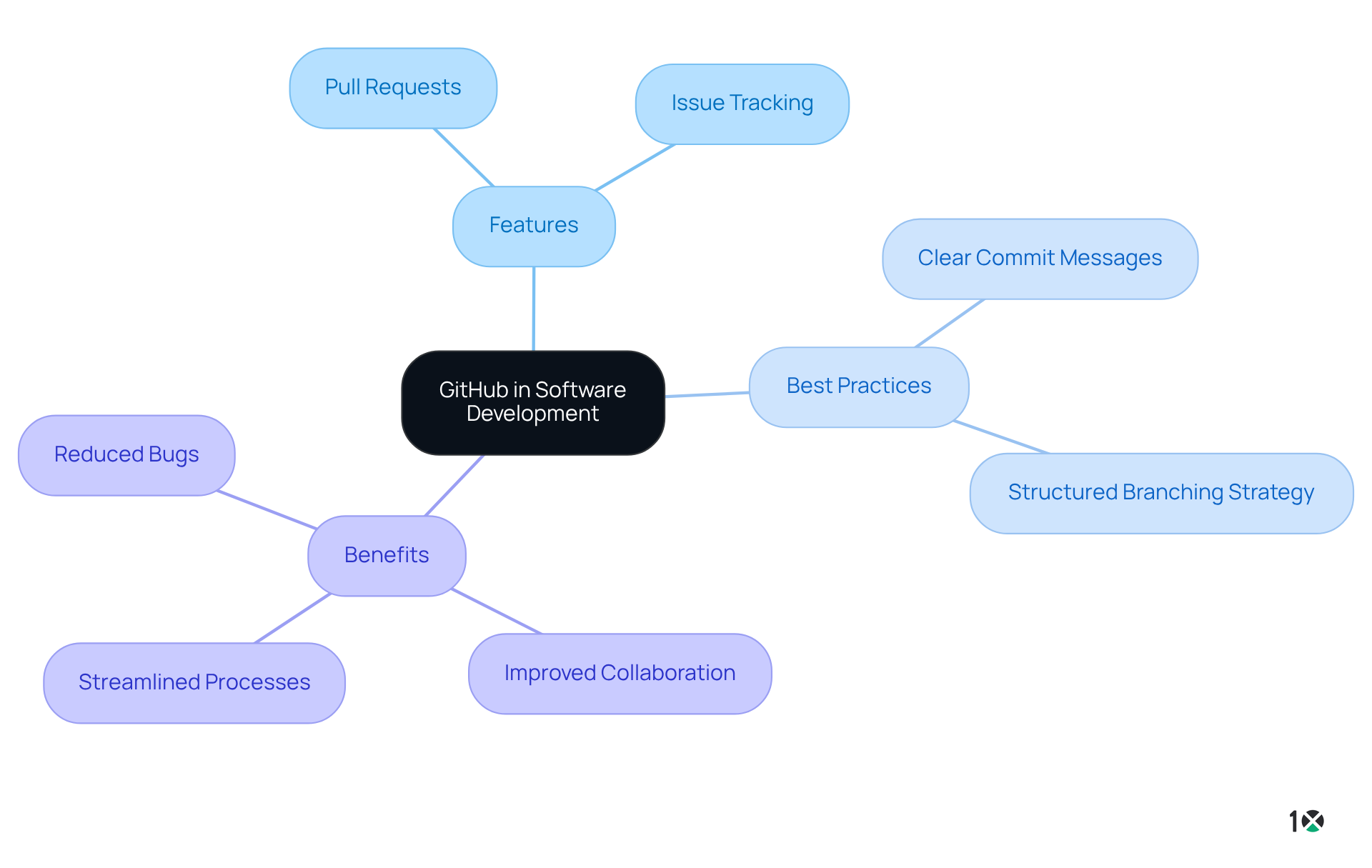
JFrog Artifactory: Universal Repository Manager for Software Distribution
JFrog Artifactory serves as a universal repository manager, empowering distributors to manage and distribute software artifacts using distribution software with remarkable efficiency. Its robust support for multiple package formats enables teams to streamline workflows, ensuring that all components are readily accessible and accurately versioned. By centralizing artifact management, JFrog Artifactory not only enhances collaboration but also simplifies the complexities of software delivery through its distribution software. This strategic approach leads to improved operational efficiency and a more cohesive development environment.
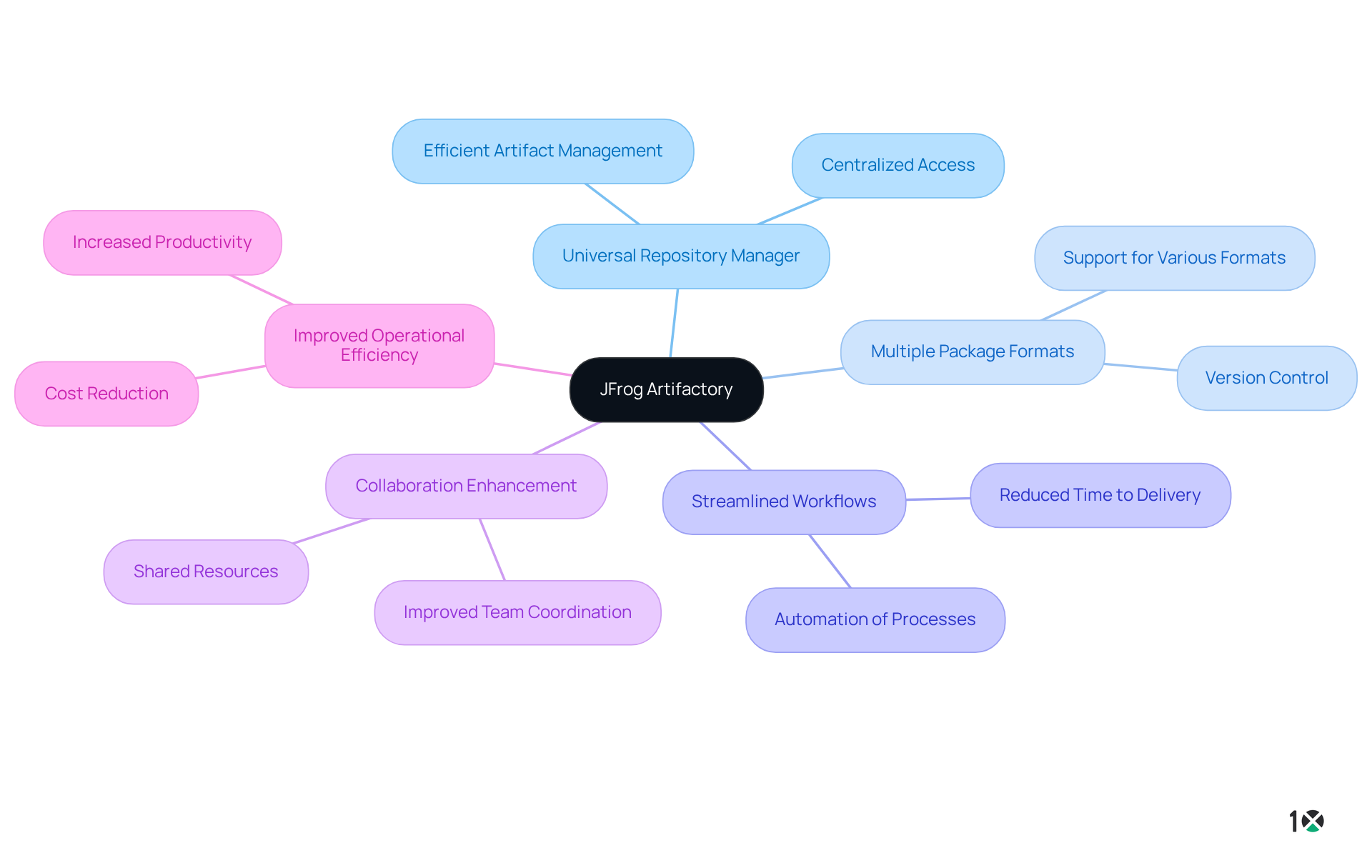
V2 Cloud: Virtual Desktop Solutions for Enhanced Distribution Efficiency
V2 Cloud’s virtual desktop solutions, integrated with distribution software, are revolutionizing distribution efficiency by providing seamless remote access to applications and information. This flexibility empowers teams to work from any location, significantly enhancing productivity and fostering collaboration. Client testimonials from 10X ERP highlight the platform’s real-time data processing capabilities and operational continuity, which are essential for businesses adapting to market demands.
With rapid deployment and intuitive interfaces, V2 Cloud ensures that distributors can maintain operational continuity while swiftly responding to the evolving landscape. As remote work trends continue to evolve, experts emphasize that such solutions are crucial for enhancing efficiency and enabling teams to operate effectively, regardless of their physical location.
Furthermore, the rapid onboarding process and user-friendly design of V2 Cloud establish it as essential distribution software that mirrors the benefits offered by 10X ERP, making it indispensable for modern distribution operations.
Conclusion
Implementing distribution software solutions is essential for businesses aiming to streamline operations and enhance efficiency. This article highlights a variety of platforms, each offering unique features that cater to the diverse needs of distributors. From the real-time data processing capabilities of 10X ERP to the scalable cloud services provided by Microsoft Azure, these tools empower companies to optimize workflows and make informed decisions.
Key insights underscore the importance of proper training and onboarding, which can significantly impact the successful adoption of these technologies. The case studies presented demonstrate how organizations have transformed their operations through the effective use of distribution software, showcasing the tangible benefits of these solutions. Furthermore, the integration of advanced analytics, machine learning, and containerization illustrates how these technologies are shaping the future of distribution.
As the distribution landscape continues to evolve, embracing these innovative software solutions is crucial for maintaining a competitive edge. Companies should carefully consider their specific operational needs and invest in the right tools that not only enhance efficiency but also foster a culture of agility and responsiveness. The potential for improved performance and customer satisfaction makes exploring these distribution software solutions a strategic priority for any forward-thinking organization.
Frequently Asked Questions
What is 10X ERP and what are its main features?
10X ERP is a cloud-based distribution software platform that enables real-time information processing, giving distributors instant access to critical data regarding inventory, sales, and financials from any location. Its intuitive interface and streamlined onboarding process help teams quickly adapt to the system, enhancing productivity.
Why is training important for implementing 10X ERP?
It is recommended that 17% of the project’s budget be allocated for training to ensure effective onboarding. Companies that invest less than 13% on training are three times more likely to encounter issues, highlighting the importance of proper training to fully leverage 10X ERP’s capabilities.
How does Microsoft Azure support distribution companies?
Microsoft Azure provides a suite of scalable cloud services designed for distribution companies, managing large volumes of data and ensuring seamless integration with existing systems. Its advanced analytics tools offer insights into supply chain performance, enabling data-driven decision-making.
What percentage of organizations have utilized Microsoft Azure since 2015?
Nearly 70% of organizations worldwide have utilized Microsoft Azure services since 2015.
What advantages does Amazon Web Services (AWS) offer to distribution companies?
AWS offers advanced data storage solutions and machine learning capabilities that help streamline logistics and inventory management. Its infrastructure ensures high availability and scalability, allowing suppliers to adapt to market demands effectively.
How has AWS improved demand forecasting for distributors?
AWS’s AI-powered demand forecasting models have demonstrated a 10% improvement in long-term national forecasts for deal events, helping distributors align their inventory with customer preferences more effectively.
What recent advancements has AWS made in logistics management?
AWS has launched tools like the AWS Supply Chain app, which provides real-time insights and demand forecasts. These advancements aim to enhance risk mitigation and improve customer experiences in the supply chain.
Why is thorough planning essential for ERP implementations?
Inadequate requirements analysis can lead to significant financial repercussions, making thorough planning and execution crucial for successful ERP implementations.
